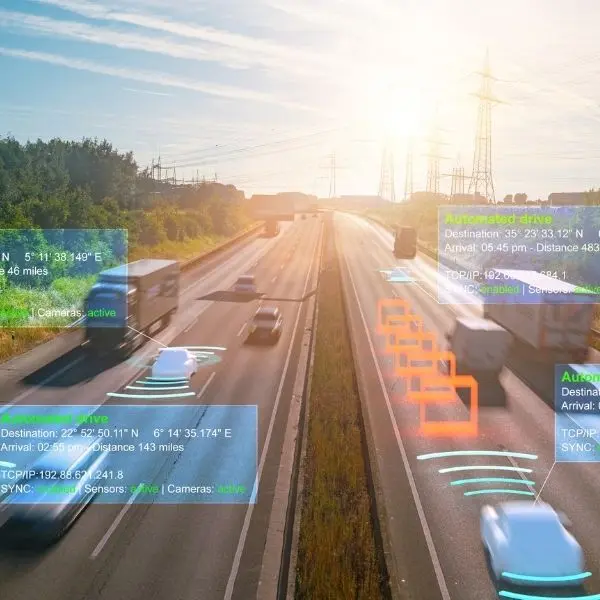
A Comprehensive Guide to AI Agents
The evolution of AI agents has been significant, reflecting advances in machine learning, data processing, and computational power. These developments have expanded the capabilities and applications of AI agents, making them integral to various industries and everyday tasks.
The significance of AI agents lies in their ability to perform tasks that typically require human intelligence, thereby increasing efficiency, accuracy, and productivity. Initially, AI agents were used in limited scenarios, such as basic data processing and simple automated responses.
However, with the advent of sophisticated algorithms and neural networks, their application has broadened significantly. AI agents now operate in diverse fields, from customer service and personal assistance to autonomous driving and complex problem-solving in scientific research. This versatility underscores the transformative impact of AI agents on modern technology and society.
The evolution of AI agents is marked by continuous improvement in their architecture and functionality. Early AI systems relied heavily on pre-programmed rules and could not adapt. Today, AI agents utilize advanced learning mechanisms, allowing them to analyze large volumes of data, identify patterns, and enhance their performance over time.
This progression from reactive to goal-based and utility-based agents has opened new possibilities for AI applications, enabling these systems to handle increasingly complex tasks with greater autonomy and intelligence. As AI technology advances, the future of AI agents promises even more innovative and efficient solutions across various domains.
Types of AI Agents
AI agents come in various forms, each with unique capabilities and applications. These types can be broadly categorized based on their complexity and the nature of their interactions with their environment. Understanding these different types helps appreciate the range of tasks AI agents can perform and the technologies that drive them. AI agents are designed to address specific needs and challenges across multiple domains, from simple reflex actions to advanced self-awareness.
Reactive Agents are considered to be the most basic form of AI agents, designed to respond to specific stimuli in their environment without needing internal states or memory. They operate based on a predefined set of rules and are typically used in straightforward applications like automated systems for temperature control. These agents lack the ability to learn from past experiences or adapt to new situations, making them suitable for tasks that require consistent and predictable responses.
Reactive agents are utilized in environments where immediate, rule-based responses are needed. For example, businesses use reactive agents in automated customer service systems, such as chatbots that provide predefined answers to frequently asked questions.

Limited Memory Agents extend the capabilities of reactive agents by incorporating a limited form of memory. They can use past experiences to inform current decisions, which allows them to perform more complex tasks than reactive agents. This type of AI agent is commonly found in applications such as autonomous vehicles, where the system must remember previous states, like the position of other cars, to navigate safely and efficiently.
Several e-commerce platforms employ these agents to recommend products based on a customer’s browsing history, enhancing the shopping experience.
Theory of Mind Agents represents a more advanced form of AI, where the agents are designed to understand and interact with human emotions, beliefs, and intentions. These agents can predict the behavior of other agents or humans by modeling their mental states. This capability is advantageous in applications involving human interaction, such as customer service bots that need to empathize with users or educational tools that adapt to students’ learning styles.
For example, virtual assistants like Siri or Alexa are being developed to understand user intent better and provide more personalized interactions. Offering more tailored support and services helps businesses improve customer satisfaction and engagement.
Self-Aware Agents are the most sophisticated type of AI agents. They possess a sense of self that allows them to understand their own states and behaviors. These agents can reflect on their actions, make adjustments based on self-assessment, and potentially understand their existence. While still largely theoretical, self-aware agents represent the pinnacle of AI development, with potential applications in advanced robotics and autonomous decision-making systems.
For instance, advanced robotics used in manufacturing could benefit from self-aware agents that can self-diagnose and correct operational errors, leading to increased efficiency and reduced downtime. This would be particularly valuable in complex production environments where minimal human intervention is desired.

Simple Reflex Agents are designed to operate based on predefined rules triggered by specific environmental conditions. They are typically used in applications that require immediate and consistent responses, such as automatic doors that open when motion is detected. These agents cannot learn or adapt, making them suitable for environments where conditions are predictable and unchanging.
For example, smart thermostats in commercial buildings use simple reflex agents to adjust heating and cooling based on detected temperature changes. This helps businesses maintain energy efficiency and provide a comfortable environment for employees and customers.
Model-Based Reflex Agents enhance simple reflex agents by maintaining an internal model of the world. This model helps them understand how their actions affect their environment, allowing for more informed decision-making. These agents are commonly used in applications like inventory management systems, where understanding the relationship between current stock levels and future needs is crucial.
In retail, inventory management systems use these agents to predict stock levels and optimize supply chain logistics based on sales data and seasonal trends. This helps businesses ensure product availability while minimizing excess inventory costs.
Goal-Based Agents are designed to achieve specific objectives by generating and following a series of actions. These agents use their internal models to assess different strategies and select the most effective one to reach their goals. They are used in complex problem-solving tasks, such as chess-playing AI or strategic planning tools, where the agent must navigate various possibilities to find the best solution.
In the business world, financial services companies use these agents for portfolio management. They analyze market conditions and make investment decisions to achieve specific financial goals. They can adapt strategies in real time based on market fluctuations, helping businesses optimize their financial performance.
Utility-Based Agents take goal-based agents a step further by evaluating the potential outcomes of different actions based on a utility function. This function helps the agent determine the best action to maximize performance according to defined criteria, such as cost, speed, or efficiency. Utility-based agents are valuable in decision-making scenarios where trade-offs are necessary, such as route planning in logistics.
In logistics, these agents can optimize delivery routes by considering factors such as distance, traffic, and fuel consumption. Companies like UPS and FedEx use such agents to improve delivery efficiency, reduce costs, and enhance customer satisfaction by ensuring timely deliveries.

Understanding these types of AI agents and their specific functionalities provides insight into AI technology’s vast potential and diverse applications. Each type serves distinct purposes, contributing to AI’s ever-expanding role in our daily lives and industries.
How AI Agents Work
Architecture and Functioning Principles
AI agents are built upon a sophisticated architecture that enables them to perceive their environment, make decisions, and execute actions autonomously. The architecture of an AI agent typically includes several key components: sensors, actuators, decision-making modules, and learning systems. Sensors gather data from the environment, such as visual inputs from cameras or temperature readings from thermometers.
The decision-making module then processes this sensory data, which uses algorithms and models to determine the appropriate actions. Actuators, like motors or digital outputs, execute these actions, allowing the agent to interact with the physical or digital world.
The functioning of AI agents relies heavily on their ability to process information and learn from experiences. For instance, model-based reflex agents maintain an internal model of the world, which helps them predict the outcomes of their actions and make more informed decisions. Goal-based agents, on the other hand, focus on achieving specific objectives by generating and following a series of actions. They assess different strategies and select the most effective one to reach their goals.
Utility-based agents evaluate potential outcomes based on a utility function, which helps them determine the best course of action to maximize performance according to criteria such as efficiency or cost. Learning agents enhance their performance over time by using past experiences to improve their decision-making processes.
The evolution of AI agents from simple reactive systems to advanced self-aware agents showcases the continuous advancements in AI technology. Early AI agents operated on predefined rules and could not adapt or learn. This progression has expanded the capabilities and applications of AI agents, making them integral to various industries, from autonomous vehicles and customer service to complex problem-solving in scientific research. As AI technology continues to evolve, the future of AI agents promises even more sophisticated and efficient solutions.
Applications of AI Agents

AI agents are transforming various sectors by enhancing efficiency, accuracy, and productivity. Their applications range from personal assistants and customer service to autonomous vehicles and industry-specific solutions. Businesses can leverage AI technology to streamline operations, improve customer experiences, and achieve strategic goals by understanding how these agents are applied in different contexts.
Personal Assistants
AI agents used as personal assistants are designed to help users manage their daily tasks and provide information quickly and efficiently. Examples include virtual assistants like Apple’s Siri, Google Assistant, and Amazon’s Alexa. These agents can schedule appointments, set reminders, provide weather updates, and control smart home devices through voice commands. These assistants offer increasingly personalized and relevant responses by learning user preferences over time, enhancing user convenience and productivity.
Customer Service
In customer service, AI agents significantly improve response times and service quality. Chatbots and virtual customer assistants can handle a wide range of queries, from answering frequently asked questions to assisting with complex troubleshooting. Companies like Zendesk and LivePerson integrate AI agents into their customer service platforms to provide instant support, reduce wait times, and free up human agents for more complex tasks. These AI agents continuously improve their responses by analyzing past interactions, leading to higher customer satisfaction and operational efficiency.
Autonomous Vehicles
AI agents are pivotal in the development and operation of autonomous vehicles. Self-driving cars from companies like Tesla, Waymo, and Uber use AI agents to navigate roads, interpret traffic signals, and make real-time driving decisions. These agents process data from various sensors, such as cameras and LIDAR, to comprehensively understand the vehicle’s environment. By integrating learning systems, autonomous vehicles can adapt to new driving conditions and improve their performance over time, enhancing safety and reliability.
Industry-Specific Applications
AI agents are also tailored for specific industries, offering solutions that address unique challenges. AI agents assist in diagnostic processes, patient monitoring, and personalized treatment plans in healthcare. In finance, they are used for fraud detection, risk assessment, and automated trading.
AI agents optimize production lines, predict maintenance needs, and improve quality control in manufacturing. These industry-specific applications demonstrate the versatility and impact of AI agents in enhancing operational efficiency, reducing costs, and driving innovation across various sectors.
By leveraging AI agents, businesses across different industries can unlock new levels of performance and efficiency, making AI an integral part of modern enterprise strategy.
Building AI Agents
Key Technologies and Tools
Building AI agents involves a combination of advanced technologies and specialized tools designed to create, train, and deploy intelligent systems. Key technologies include machine learning algorithms, neural networks, natural language processing (NLP), and computer vision. Machine learning algorithms enable AI agents to learn from data and improve their performance over time.
Neural networks, particularly deep learning models, allow AI agents to process complex patterns and make decisions based on large datasets. NLP is crucial for AI agents interacting with humans, enabling them to understand and generate human language. Computer vision technologies, including image recognition and object detection, are essential for AI agents interpreting visual information from their environment.

In addition to these core technologies, various tools and platforms support the development and deployment of AI agents. Frameworks such as TensorFlow, PyTorch, and Keras provide the infrastructure for building and training machine learning models. Tools like spaCy and the Natural Language Toolkit (NLTK) are widely used for natural language processing.
Cloud-based platforms such as AWS, Google Cloud, and Microsoft Azure offer scalable resources for training and deploying AI models. These platforms often include pre-built AI services, such as speech recognition and image analysis, which can be integrated into AI agents to enhance their capabilities. Utilizing these technologies and tools, developers can create AI agents that are robust, efficient, and capable of handling complex tasks.
Implementation Strategies and Best Practices
Successful implementation of AI agents requires strategic planning and adherence to best practices. One crucial strategy is to clearly define the goals and objectives the AI agent is expected to achieve. This involves understanding the specific problems the agent will solve and the desired outcomes.
It is also essential to ensure that the AI agent is trained on high-quality, relevant data, as its performance heavily depends on the data it learns from. Regularly updating the training data and retraining the models helps maintain the agent’s accuracy and relevance over time.

Another best practice is incorporating a modular design in the AI agent’s architecture, allowing flexibility and scalability. Modular design enables developers to update or replace individual agent components without affecting the entire system. It is also important to implement robust monitoring and evaluation mechanisms to continuously assess the AI agent’s performance.
This includes tracking key performance indicators (KPIs) and using feedback loops to refine the agent’s behavior. Ensuring ethical considerations and compliance with regulatory standards is also vital. This involves addressing data privacy, security, and potential biases in decision-making. By following these strategies and best practices, businesses can effectively deploy AI agents that deliver significant value and drive innovation.
The Benefits of AI Agents
Efficiency and Productivity
One of the most significant benefits of AI agents is their ability to enhance efficiency and productivity across various business processes. By automating repetitive and time-consuming tasks, AI agents free up human workers to focus on more strategic and creative activities.
For example, in customer service, AI agents can handle routine inquiries, process orders, and provide support around the clock, significantly reducing response times and improving customer satisfaction. In manufacturing, AI agents can optimize production lines, monitor equipment health, and predict maintenance needs, leading to increased uptime and reduced operational costs.
AI agents also improve productivity by streamlining workflows and ensuring tasks are completed accurately and consistently. Personal assistants like Siri and Alexa help users manage their schedules, set reminders, and control smart devices, enhancing daily productivity. In corporate environments, AI agents assist with data analysis, report generation, and project management, enabling employees to achieve more in less time. Integrating AI agents into business operations boosts individual productivity and enhances overall organizational efficiency.
Accuracy and Reliability
AI agents are renowned for their accuracy and reliability, which are crucial in environments where precision is paramount. Unlike humans, AI agents do not suffer from fatigue or cognitive biases, ensuring that tasks are performed with consistent accuracy. In financial services, AI agents are used for fraud detection and risk assessment, where their ability to analyze large datasets quickly and accurately helps identify suspicious activities and minimize risks. In healthcare, AI agents assist in diagnosing diseases, recommending treatments, and monitoring patient health, where accuracy can significantly impact patient outcomes.
Moreover, AI agents can process and analyze data at an unattainable scale and speed for humans, enhancing the reliability of decision-making processes. Autonomous vehicles, for example, rely on AI agents to interpret sensor data and navigate complex environments safely. The high accuracy of these systems is critical for ensuring passenger safety and operational reliability. By providing accurate and reliable performance, AI agents help businesses reduce errors, improve quality, and build trust with their stakeholders, ultimately contributing to better business outcomes and increased competitiveness in the market.
Challenges of AI Agents
Ethical Considerations
One of the primary challenges of deploying AI agents is navigating the complex landscape of ethical considerations. AI agents, particularly those involved in decision-making processes, can inadvertently perpetuate biases in their training data.
This can lead to unfair or discriminatory outcomes, especially in hiring, loan approvals, and law enforcement. For instance, an AI agent used in recruitment might favor specific demographics if the training data reflects historical biases. Addressing these ethical concerns requires developers to implement rigorous data auditing and bias mitigation strategies during the development and deployment of AI agents.
Moreover, the transparency and explainability of AI agents are crucial ethical considerations. Users and stakeholders must understand how AI agents make decisions, especially in critical applications like healthcare and finance. Ensuring that AI systems are interpretable helps build trust and accountability. Efforts are being made to create explainable AI (XAI) frameworks that provide insights into the decision-making processes of AI agents, thereby enhancing their ethical deployment in various sectors.

Security Concerns
Security is another significant challenge associated with AI agents. As AI systems become more integrated into critical infrastructure and business processes, they become attractive targets for cyberattacks. AI agents can be exploited through adversarial attacks, where malicious inputs are designed to deceive the AI into making incorrect decisions.
For example, an AI agent managing cybersecurity can be tricked into ignoring a threat if it encounters adversarial data crafted by hackers. Ensuring robust security measures, such as continuous monitoring, encryption, and adversarial training, is essential to protect AI agents from such vulnerabilities.
Furthermore, the data used to train and operate AI agents must be safeguarded against breaches. Proper data protection protocols can put personal and sensitive information at risk. Businesses must comply with data privacy regulations, such as GDPR, and implement stringent access controls to ensure that data used by AI agents is secure and private. These security practices help mitigate risks and protect the AI systems and the data they process.
Potential Risks and Mitigation Strategies
Deploying AI agents comes with several potential risks that must be proactively managed. One major risk is the overreliance on AI agents for critical decision-making without sufficient human oversight. If the AI agent encounters a situation outside its training scope, this can lead to catastrophic failures. Mitigation strategies include implementing hybrid systems where AI agents work alongside human experts, ensuring that humans review and validate critical decisions.
Another risk involves the scalability and adaptability of AI agents. As business environments and external conditions evolve, AI agents must be regularly updated and retrained to remain effective. This requires continuous monitoring and maintenance and quickly adapting to new data and scenarios. Developing robust feedback mechanisms and implementing incremental learning approaches can help AI agents adapt to changing conditions and maintain their reliability and effectiveness over time.
By addressing these ethical, security, and risk management challenges, businesses can ensure the responsible and effective deployment of AI agents, maximizing their benefits while minimizing potential drawbacks.
What is the Future of AI Agents
Expected Advancements and Innovations
The future of AI agents is poised for significant advancements and innovations driven by ongoing research and technological development. One expected advancement is the enhancement of learning capabilities, allowing AI agents to process and analyze more complex data sets with greater speed and accuracy.
This includes improvements in deep learning algorithms and the integration of advanced neural networks, enabling AI agents to perform tasks that require higher levels of cognitive function and adaptability. Innovations in natural language processing (NLP) will also play a crucial role as AI agents become more adept at understanding and generating human language, leading to more natural and effective interactions in applications like customer service and personal assistants.

Another area of expected innovation is the development of multi-agent systems, where multiple AI agents work collaboratively to achieve complex goals. These systems will be capable of dynamic task allocation and real-time communication, enhancing their efficiency and effectiveness in environments such as autonomous driving, smart manufacturing, and large-scale data analysis. Additionally, advancements in quantum computing could revolutionize AI agent capabilities, providing unprecedented computational power to solve problems that are currently intractable for classical computers.
Trends and Predictions
Several key trends and predictions indicate the direction of AI agent development and deployment. One prominent trend is the increasing integration of AI agents into everyday devices and systems, making them more ubiquitous and seamlessly embedded into our daily lives. This includes the proliferation of smart home devices, wearable technology, and Internet of Things (IoT) applications, all powered by sophisticated AI agents capable of continuous learning and adaptation.
Another trend is the growing focus on ethical AI, with significant efforts to ensure transparency, fairness, and accountability in AI agent decision-making processes. This will involve the development of frameworks and standards to govern the ethical use of AI, particularly in sensitive areas such as healthcare, finance, and law enforcement.
Predictive trends also highlight the potential for AI agents to drive significant economic and societal impacts. As AI agents become more advanced and widely adopted, they are expected to contribute to substantial productivity gains and economic growth across various sectors. In addition, the rise of AI agents will likely lead to new job roles and opportunities as businesses and industries adapt to the changing technological landscape. However, this shift will also necessitate focusing on reskilling and upskilling the workforce to ensure that humans can work effectively alongside AI agents.
The future of AI agents is marked by exciting advancements and innovations, promising to enhance their capabilities and integration into various aspects of life and business. As these trends unfold, the continued focus on ethical considerations and the strategic deployment of AI agents will be crucial in maximizing their benefits while mitigating potential risks.
Ready to Grow Your Search Engine Results?
Let Digital Results assist you in your SEO strategy and help
deliver the search engine results you need.






